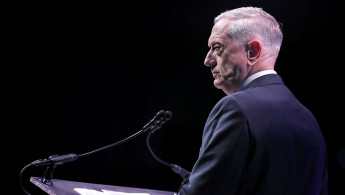US defence secretary slams Riyadh for casualties in Yemen
US Defence Secretary James Mattis said Friday the US is determined to reduce the number of civilian casualties in the Saudi-led campaign against rebels in Yemen and will press ahead with efforts to train Saudi pilots to identify legitimate targets.
His comments to reporters at the Pentagon followed a UN report on Thursday that said more than 100 civilians had been killed in airstrikes in Yemen in just the past 10 days.
"We are going to continue to train them how to do target identification, try to get their capabilities up in those areas. We're going to continue to work with their pilots and explain how you do bombing runs, that sort of thing," Mattis said.
"Anything we can do to limit the civilian casualties, we will be doing ... We are going to try to make that military of the Saudis more capable of carrying out what they find to be their military necessity without killing innocents."
At the same time, he blamed the Houthi rebels - who took over Yemen's capital city Sanaa in September 2014 - for stockpiling weapons in residential areas, which he said was not a sign that they care about the safety of civilians.
On Thursday, the UN humanitarian coordinator for Yemen said that Saudi-led airstrikes had killed 109 civilians since 18 December, including at least 54 in airstrikes on a market in the western province of Taiz.
Fourteen people from the same family were killed in an airstrike on a farm in the coastal Hodeidah province.
The Saudi-led coalition fighting the Houthis criticised the UN statement, calling it "biased" toward the rebels and calling on the body to review the humanitarian work mechanism and the competence of its employees in Yemen.
It said the statement created "a constant state of uncertainty about the information and data on which the UN relies and undermines its credibility".
The Houthis, who have now disassociated from forces loyal to the former slain President Ali Abdullah Saleh, are fighting government forces backed by a Saudi-led Arab military coalition.
More than 10,000 people - over half of them civilians - have been killed since the coalition intervened in 2015.
The fighting has caused a humanitarian catastrophe which the UN says is the world's worst, pushing seven million people to the brink of famine and sparking a cholera outbreak that the World Health Organisation says has killed 2,000 people.





 Follow the Middle East's top stories in English at The New Arab on Google News
Follow the Middle East's top stories in English at The New Arab on Google News
![The UAE is widely suspected of arming the RSF militia [Getty]](/sites/default/files/styles/image_330x185/public/2024-11/GettyImages-472529908.jpg?h=69f2b9d0&itok=Yauw3YTG)
![Netanyahu furiously denounced the ICC [Getty]](/sites/default/files/styles/image_330x185/public/2024-11/GettyImages-2169352575.jpg?h=199d8c1f&itok=-vRiruf5)
![Both Hamas and the Palestinian Authority welcomed the ICC arrest warrants [Getty]](/sites/default/files/styles/image_330x185/public/2024-11/GettyImages-2178351173.jpg?h=199d8c1f&itok=TV858iVg)